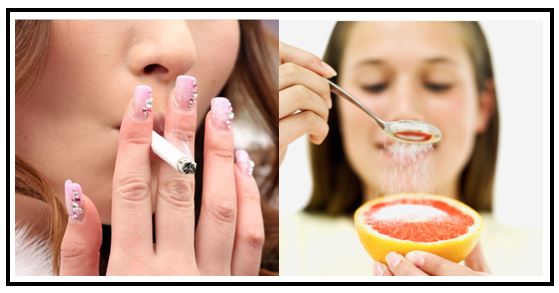Learn about brain health and nootropics to boost brain function
Long term abuse of NICOTINE or SUGAR drives depression, stress and anxiety through the roof – How will YOU overcome? (contributor content)

( Natural News ) (Contributor content) – Feeling anxious, depressed, or stressed? Most consumers have a major “crutch” they use to “get by” every day, throughout the day, that relieves them of these physical and mental conditions, but it’s only short-lived relief, and when the “juice” runs out, they have to “re-up” with more and more, driving the addiction deeper, with worsened symptoms, and making it harder to quit. Two of the most popular “crutches” and addictions in the world are sugar and nicotine. Others include alcohol, caffeine, prescription painkillers, and street drugs.
Nearly half of all Americans are overweight, and half of those folks are considered obese. Plus, one in every four Americans uses nicotine, whether by smoking, vaping, dipping, or chewing. After long term use and abuse of either or both, it is quite common for anxiety, depression, and stress to deepen their roots, and rear their ugly heads every time the sugar or nicotine “fix” wears off.
Do you feel like your physical and/or mental health is spiraling out of control? Depression can really make a person feel hopeless and defeated. Mental stress can quickly manifest into physical symptoms and even disease and disorder. Anxiety can lead to panic attacks and nervous system disorders. What to do? Let’s start this one off with sugar addiction. Humans are born hardwired to love sweet tasting foods because it’s a survival mechanism, so what’s the problem?
All humans are wired to like sweet tastes, as this protects us from eating toxic foods, so where did this all get so warped? How did sugar become a mental health problem, fueling depression and anxiety? Let’s take a look at sugar’s role in the brain to understand. Table sugar is highly processed from beets or sugar cane, with zero nutritional value, and acts like a drug, rather than a food.
They key is to watch out for white sugar, high fructose corn syrup (HFCS), and “added sugars” in all foods and beverages, as these contribute to chronic brain inflammation , which is a key underlying cause of… wait for it… psychiatric and neurodegenerative disorders, including depression and anxiety. Read the labels on everything you buy and avoid “added sugars” like the plague.
Sure, you pound some baked sweets or chug a Starbucks specialty frap, and you feel better temporarily, but then comes the crash, the withdrawal symptoms, and then depression. Serotonin and dopamine levels become a rollercoaster ride, with high ups and low downs (spikes then crashes), as neurotransmitters simply wait for the crutch. Energy and mood go right along for the ride, and when blood sugar crashes, anxiety can spike. Even long term use and abuse of “added sugars” can result in dementia , according to studies published by the National Institutes of Health. Nicotine dependence is scientifically correlated with depression, anxiety and stress
According to research published by NIH, “Smoking is linked to psychological symptoms and shows a moderate to high level of nicotine dependence …a correlation between nicotine dependence, on one hand, and depression and stress on the other.” Currently, more than 35 million people in America are addicted to smoking cigarettes, and 15 million are addicted to vaping, including teenagers and even some children (just ask middle school teachers).
Over time, nicotine use constricts blood vessels, limiting the delivery of oxygen and nutrients throughout the body. Of course, this drives all kinds of health problems, including, chronic fatigue, brain fog, sleeplessness, anxiety, depression , and of course, stress. Nobody plans for this when they start smoking or vaping, but it’s almost inevitable with continued use. The worst part is that Big Pharma and Big Tobacco are “in bed” together, always in cahoots, coming up with “nicotine alternatives” that just keep people addicted to the world’s third-most-addictive drug, including the patch, gum, lozenges, and inhalers. What to do about it? Remedy is defined as a substance of medical value derived from plants or natural sources and used as treatment for disease or disorder
A remedy is something that corrects or counteracts something, making a right from a wrong, or making up for a loss. A remedy is intended to cure you when you are ill. An herbal remedy is a “medication” (Big Pharma hates when natural health advocates use their word) prepared from plants, and this includes most traditional remedies for disease. What if there are natural remedies for ending addiction cravings , and doing so without withdrawals or that dreaded “crash?” Guess what? There are several, and they’ve been around for centuries, but most Americans just don’t know what to look for and where to look.
Many people are figuring out they can replace bad habits, like consuming too much sugar, nicotine, alcohol, or caffeine, by putting to work for them a new supplement beverage called Krave Kicker , that contains mucuna pruriens extract, a potent natural superfood, and vitamin B12 as methylcobalamin. The propriety blend is the ultimate boost for dopamine levels while helping to balance the central nervous system. It’s good to know there’s a natural remedy for everything under the sun, you just have to know what to look for and where.
Special Note: This article was authored by Herbal Remedy Insider, a researcher for Krave Kicker, the manufacturer of a functional beverage that contains a natural, herbal remedy for addiction cravings. This publisher was NOT compensated in any way for carrying this article. It is not a sponsored article, but the author is receiving publicity of this news item in exchange for providing the article at no cost.
Research for this article includes:
BeBrainFit.com
Healthline.com
NaturalNews.com
KraveKicker.com
NCBI.nlm.nih.gov
Pubmed.ncbi.nlm.nih
DrHealthBenefits.com
VeryWellMind.com
Read more at www.naturalnews.com